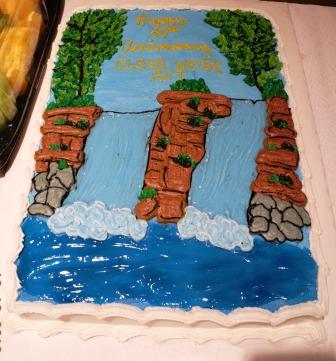
The birthday ice cream cake said it best, “Happy Birthday Clean Water Act!”
That’s right.
Members of Murray State University, Great Rivers Group of the Kentucky Sierra Club and major water stakeholders of West Kentucky threw a birth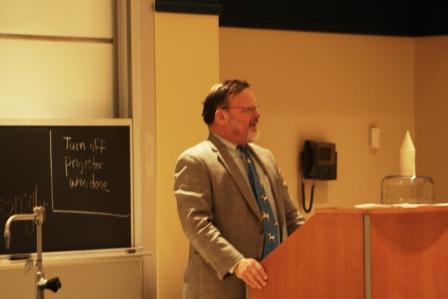 day party to pay respect to the 40th year that President Richard M. Nixon signed the Clean Water Act of 1972. day party to pay respect to the 40th year that President Richard M. Nixon signed the Clean Water Act of 1972.
They dined on two Dairy Queen large sheet ice cream chocolate cakes with an inch cream topping. Owner of the Dairy Queen, Hal Kemp, also a candidate for House of Representative, said, “He and his team were proud to be a part of the birthday celebration. “
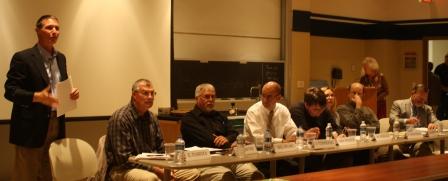 On a brisk chilly evening, October 18th, 2012 on Murray State University Campus, 94 individuals came together to discuss the importance of water, water usage, water quality, and the future of the Clean Water Movement born in 1972. These were environmentalists, Ingram Barge Company, soil and land conservationists, students, researchers, foundations, and plain ordinary citizens concerned about how water is used in West Kentucky. On a brisk chilly evening, October 18th, 2012 on Murray State University Campus, 94 individuals came together to discuss the importance of water, water usage, water quality, and the future of the Clean Water Movement born in 1972. These were environmentalists, Ingram Barge Company, soil and land conservationists, students, researchers, foundations, and plain ordinary citizens concerned about how water is used in West Kentucky.
From 7:00 p.m. to 9:00 p.m. moderator Dianna Riddick of Benton, Kentucky kept the evening discussion on target and on time. Riddick, one of the lawyers present on this evening, is also the President of the Great Rivers Group, Sierra Club.
Riddick focused on the panelists as she introduced them by their titles. Each one has a special set of skills, experiences, and relationship to water and the environment in Kentucky.
Fourteen Murray State Students from the Murray Environmental Student Society (MESS) were the first to speak at the event. They gave the audience of over eighty people a pop test on issues and usages of water. That discussion is in a second story of this newsjournal, please read it for their questions and answers.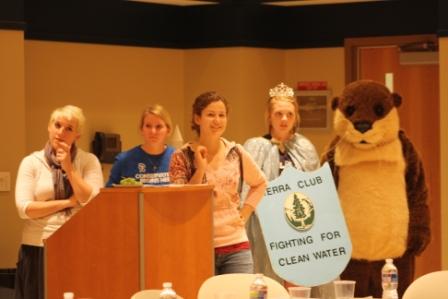
The students did an excellent job of shocking the room with their insight and facts about how Americans use water.
Riddick then introduced the main speaker for the conference, Hank Graddy, an environmental attorney from Midway, Kentucky, just outside Lexington, Kentucky. For 15 minutes, Graddy talked of the vast federal, state, and local legal issues around fresh water, coal mining, and new energy sources. He ended his talk with the single statement that “How we use fresh water in our future will be America’s major national security issue of our times.”
After Graddy, the remaining panelists each spoke about 10 minutes to their area of expertise. From Inland Barge executives to a soil specialist over to water manager or water researcher to youth activist, each of these voices blended during the evening to come together in harmony in their concerns about water and America’s future with or without access to freshwater.
Jason Adams, Ingram Barge Company, spoke to the fact that Ingram is now the largest player or stakeholder on the rivers of the Inland Waterways System. Ingram now owns over 1500 barges and 150 vessels. Many of these vessels serve as floating operations centers, cafeterias and hotels for their employees. Adams also addressed the good record Ingram has for recycling and leading the way for sustainability on the rivers.
Charles McIntire, Natural Resources Soil Conservation specialist, spoke to the problems of balancing the demands of large scale farming practices to the new real world demands of extreme weather patterns. The role of Soil Conservation is to reach a point where wetland resources are kept back to their natural state of existence.
This policy must now deal with large scale water farming by corporate farms. These farmers now have the ability to pull 2500 gals of water a minute into their irrigation systems. This rate of flow can exceed over 2 million gallons a day on some of the larger farm operations.
James Townsends (Army Corps of Engineers) spoke of the Corps responsibility to maintain the rivers of America free from any problems with navigation. He maintained that the Corps is always ready to work with other groups in defining a common ground for bringing other resources to impact local government and main streets.
John Walker, younger generation spokesman, laid out a plan for his peer group 20 somethings to work with all those over 30.
Maggie Morgan, from the Jackson Purchase Foundation, brought another perspective to the panel. She works in the non-profit world trying to coordinate resources to wetlands problems. Her organization is working with a private public project involving over $500,000 to reclaim wetlands.
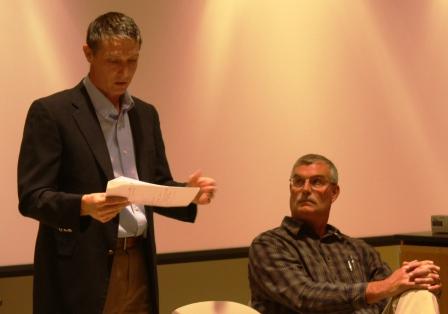 Howard Whiteman, of the MSU Watershed Institute, gave an overview of the major research efforts being conducted on the MSU campus. This involves the Hancock Biological Station at Kentucky Lake, the Mid America Remote Sensing Satellite project, and the Watershed Institute. Howard Whiteman, of the MSU Watershed Institute, gave an overview of the major research efforts being conducted on the MSU campus. This involves the Hancock Biological Station at Kentucky Lake, the Mid America Remote Sensing Satellite project, and the Watershed Institute.
Riddick spoke to the feeling that this event had been a major success, if only one standard was used to measure success. That measurement would be the degree that traditional and non traditional users or stakeholders of water could come together and hammer out the beginnings of a common agreement on how to proceed into the future on this hard issue.
Several of the Great Rivers Group, Sierra Club felt that this event had in fact establish a new platform for water stakeholders, both industry and environmental, to now try to proceed together in reaching common sense laws and regulations governing water usage.
Probably, the best quote of the evening was given by Gene Nettles, Great Rivers group, when looked out across the large MSU lecture hall filled with concerned individuals, and simply smiled and said,
“I now feel we have a chance to correct the damage of bad policy and lack of common sense with regard to water. We now have a common beginning point for building workable dialogue for change. We now have a point of hope for the future!”
|



 day party to pay respect to the 40th year that President Richard M. Nixon signed the Clean Water Act of 1972.
day party to pay respect to the 40th year that President Richard M. Nixon signed the Clean Water Act of 1972.  On a brisk chilly evening, October 18th, 2012 on Murray State University Campus, 94 individuals came together to discuss the importance of water, water usage, water quality, and the future of the Clean Water Movement born in 1972. These were environmentalists, Ingram Barge Company, soil and land conservationists, students, researchers, foundations, and plain ordinary citizens concerned about how water is used in West Kentucky.
On a brisk chilly evening, October 18th, 2012 on Murray State University Campus, 94 individuals came together to discuss the importance of water, water usage, water quality, and the future of the Clean Water Movement born in 1972. These were environmentalists, Ingram Barge Company, soil and land conservationists, students, researchers, foundations, and plain ordinary citizens concerned about how water is used in West Kentucky.
 Howard Whiteman, of the MSU Watershed Institute, gave an overview of the major research efforts being conducted on the MSU campus. This involves the Hancock Biological Station at Kentucky Lake, the Mid America Remote Sensing Satellite project, and the Watershed Institute.
Howard Whiteman, of the MSU Watershed Institute, gave an overview of the major research efforts being conducted on the MSU campus. This involves the Hancock Biological Station at Kentucky Lake, the Mid America Remote Sensing Satellite project, and the Watershed Institute.



